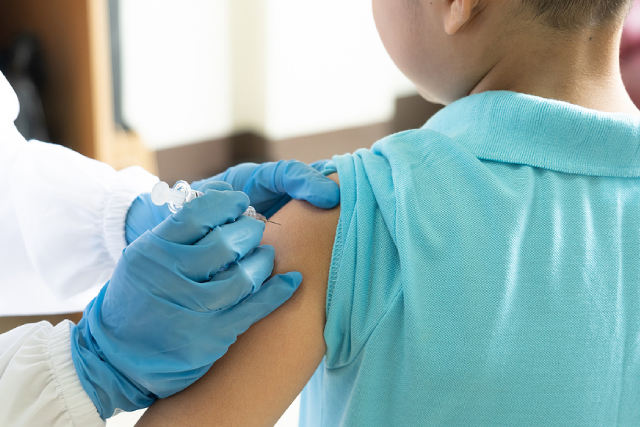
blog
Baby and Child Vaccinations: Answering Common Questions

Vaccinations are crucial in protecting babies and children from serious illnesses and diseases. However, navigating the world of vaccinations can be overwhelming for parents, especially with abundant information, myths, and misconceptions circulating.
In this article, we aim to address common questions parents may have about baby and child vaccinations, providing accurate information to help them make informed decisions regarding their child's health.
What Are Vaccinations and How Do They Work?
Vaccinations, also known as immunisations, are preventive measures designed to stimulate the body's immune system to recognise and fight off specific diseases.
They contain weakened or inactive forms of pathogens (such as viruses or bacteria) or their toxins, which prompt the immune system to produce antibodies without causing the actual disease. These antibodies provide immunity, so if the child is exposed to the disease-causing pathogen in the future, their immune system can quickly recognise and neutralise it, preventing illness or reducing its severity.
Why Are Vaccinations Important for Babies and Children?
Vaccinations are vital for babies and children for several reasons:
1. Disease Prevention: Vaccinations protect children from potentially life-threatening diseases such as measles, mumps, rubella, polio, pertussis (whooping cough), hepatitis, and influenza.
2. Community Immunity: Vaccinations help establish herd immunity within communities by reducing the spread of diseases. This protects not only vaccinated individuals but also those who cannot be vaccinated due to medical reasons or age, such as newborns and individuals with weakened immune systems.
3. Prevent Complications: Vaccinations can prevent serious complications associated with certain diseases, including pneumonia, meningitis, deafness, brain damage, and death.
4. Cost-Effectiveness: Vaccinations are a cost-effective public health intervention. The financial burden of treating vaccine-preventable diseases, including medical expenses and lost productivity, far outweighs the cost of vaccination programs.
When Should Baby and Child Vaccinations Begin?
The vaccination schedule for babies and children is typically recommended by healthcare providers and public health authorities and is designed to provide optimal protection at different stages of development.
Individuals living in Singapore can refer to the National Childhood Immunisation Schedule (NCIS) by the Ministry of Health (MOH).
Are Vaccines Safe for Babies and Children?
Vaccines are rigorously tested for safety and effectiveness before being approved for use. Extensive clinical trials are conducted to evaluate vaccines' safety, efficacy, and potential side effects in diverse populations, including infants and children. Regulatory agencies, such as the World Health Organization (WHO), continuously monitor vaccine safety and conduct post-marketing surveillance to identify and investigate any adverse events.
While vaccines can cause mild side effects such as redness or soreness at the injection site, low-grade fever, or fussiness, severe adverse reactions are rare. Ultimately, the benefits of vaccination in preventing serious diseases far outweigh the risks of potential side effects.
Do Vaccines Cause Autism or Other Developmental Disorders?
No, vaccines do not cause autism or other developmental disorders. Numerous scientific studies have thoroughly investigated the purported link between vaccines and autism, and no credible evidence supports such claims. The original study that suggested a connection between the measles, mumps, and rubella (MMR) vaccine and autism has been thoroughly discredited and retracted by the journal that published it.
The consensus among the scientific and medical communities is that vaccines are not associated with autism or developmental disorders. Parents can rest assured that vaccinating their children according to the recommended schedule does not increase the risk of autism or other neurological conditions.
Can I Delay or Skip Vaccinations for My Child?
While some parents may consider delaying or skipping vaccinations due to concerns about safety or personal beliefs, doing so can pose serious risks to the child's health and to public health overall. Vaccination schedules are designed to provide timely protection against diseases when children are most vulnerable.
Delaying or skipping vaccines increases the child's susceptibility to vaccine-preventable diseases, leaving them unprotected during critical periods of their development. It also undermines community immunity, putting others at risk, especially those who cannot be vaccinated for medical reasons.
Parents who have concerns about vaccines should discuss them with their healthcare provider to address any questions or apprehensions. Healthcare professionals can provide evidence-based information and guidance to help parents make informed decisions about their child's vaccinations.
Conclusion
Baby and child vaccinations are a cornerstone of public health, offering protection against serious diseases and contributing to healthier communities. While it's natural for parents to have questions and concerns about vaccines, understanding the importance, safety, and benefits of vaccines can help parents make informed decisions regarding their child's health. By following the recommended vaccination schedule and working with healthcare providers to address any concerns, parents can ensure that their children receive the best possible protection against vaccine-preventable diseases.
If you’re looking for baby immunisation vaccination in Singapore, reach out to us at Babysteps Medical. We offer house call doctor services like newborn jaundice treatment and child developmental assessment in Singapore.



